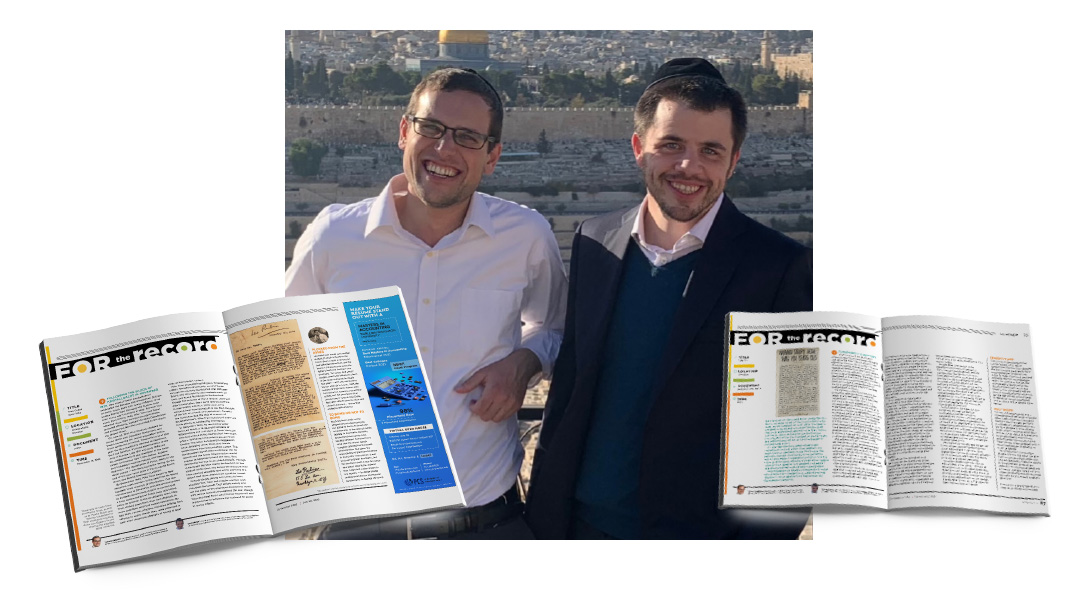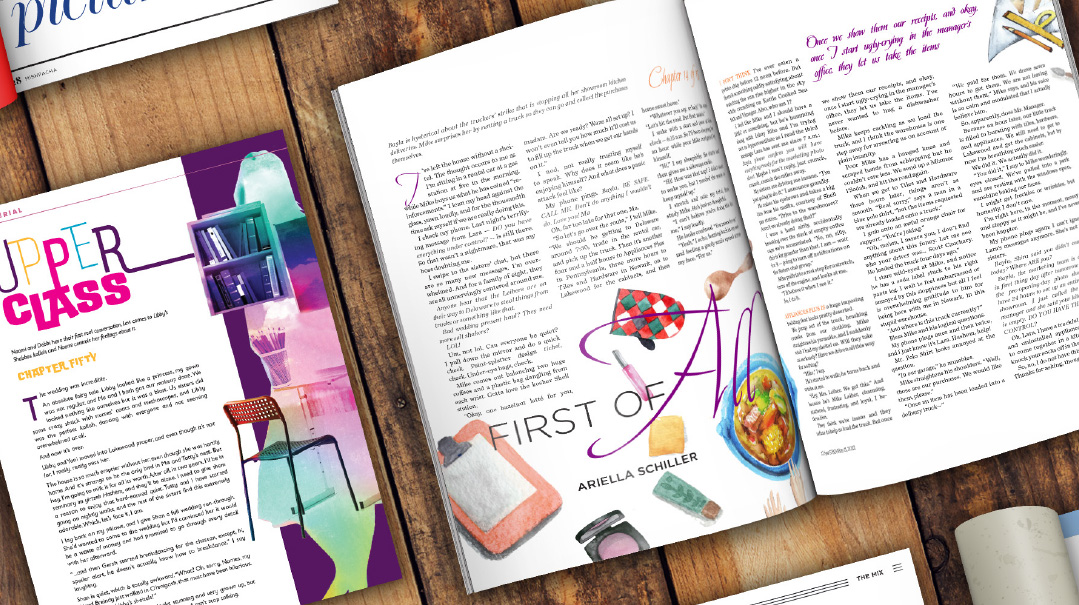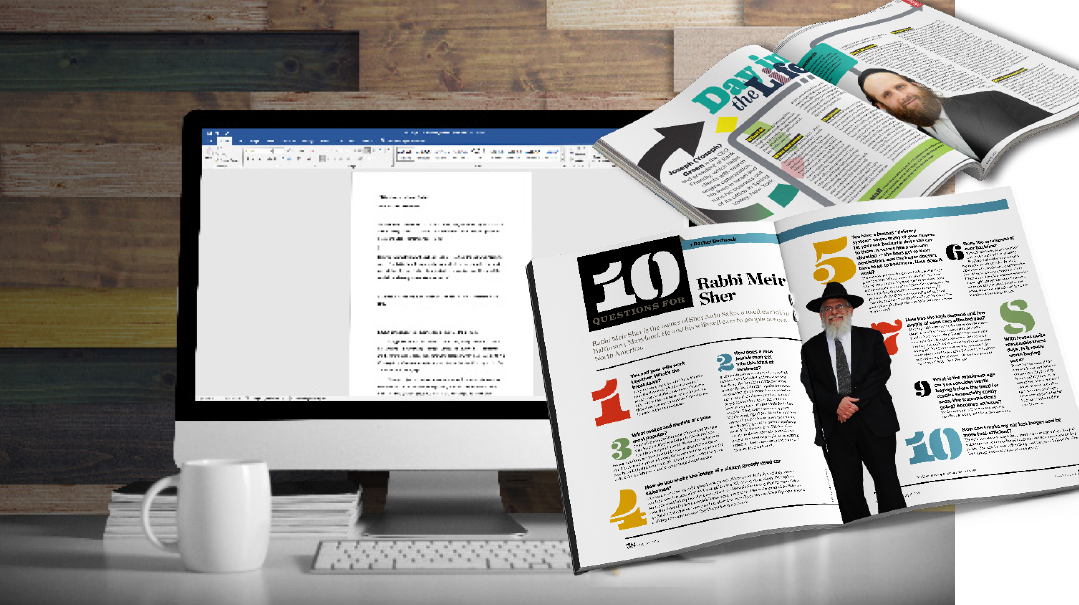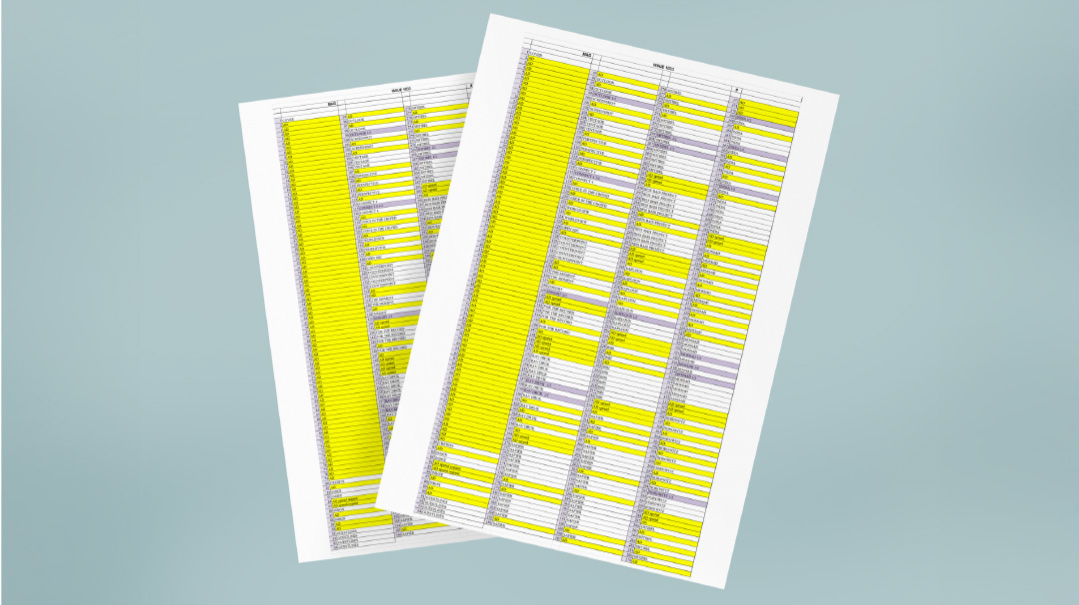20 Questions for… Nina Feiner
| September 3, 2024“Seeing such tangible results — a beautifully laid out magazine that I helped create — makes me proud”

Nina Feiner serves as Mishpacha’s sales manager for the North America edition of the magazine. She is responsible for leading the US sales team in bringing ads to the magazine, sending reservations to the Israel-based production team, and ensuring ad placement in the magazine pages. Nina joined Mishpacha’s advertising department 15 years ago as an agency sales coordinator, following a stint managing trade shows and marketing at Lubicom.
My ideal work environment
My house. It’s quiet and there are no distractions.
Deadlines make me…
Work. After 15 years of weekly deadlines, they are part of my life.
I learned the most from
My father a”h, a real doer who helped anyone in need, who worked in nonprofits his whole life and started many programs to help the poor and needy. His goal in life was to do what needed to be done — I hope I live up to his expectations.
The best piece of advice I got
“The customer is always right” — a business mantra that emphasizes the importance of customer satisfaction and company service, and something we always try to live by. But I do have to remember that while client feedback is valuable, there are times when the demands are unreasonable, and my job is to balance customer satisfaction and manage expectations, all with fairness and sensitivity.
1 What does your week look like?
On Sunday and Monday, I’m up at 7 a.m. working on the page layouts of the magazine. This is the actual process of designating the placements for the reserved ads in that week’s issue, and it can be done only at the later stages of production. We close Family First for print on Sunday, and the main magazine is closed on Monday. Over the next three days, I work on ad sales for the next issue, as well as billing and collections for prior issues. Friday is for finalizing sales and sending in placement requests and design specs to our production team. The fun continues on Motzaei Shabbos with last-minute ads and changes, and then it’s our Sunday print day... and the week starts again.
2 What do you seek when hiring staff for your department?
People who are very organized and detail-oriented, and are self-starters. They need to know how to sell and have good communication skills.
3 What has changed in the marketing industry over the years?
The quality of advertisements. Ads today are far more sophisticated and enjoyable for readers to consume, which we see from the incredible feedback we get. The latest is that AI has totally changed the game for ads, and professional marketing firms are churning out top-notch graphics.
4 What are the top three elements of a good ad?
Message — whether it’s a teaser, a branding ad, or a call to action, ads that are on message leave an impact.
Font — this is important because it expresses the brand’s identity, it sets the tone for the ad. It also has to be easy to read.
Layout and images — high-quality graphics that are clear and get readers’ attention quickly.
5 What is different about an ad in Mishpacha than an ad in a secular publication?
Our ads are curated for our community, so they’re specifically marketing to a niche group of people and reviewed by our rabbinic board. What that means is there’s less throwing things at the wall to see what sticks and more speaking directly to your target market. That’s almost impossible in secular media, especially in print.
6 What is the best ad you’ve ever seen in Mishpacha, hands down?
There are so many, it’s hard to pick. I think the Gefen “higher standard” ads that came out in 2017 were masterpieces! There was no AI then, either, just good ole digital artistry!
7 Which advertisement touched you most?
The Ezer Mizion ad designed by Pivot is my favorite. It was a two-page spread of lines of hearts with one broken heart in the middle, portraying how the organization’s bone marrow registry saves lives but there’s still one person waiting for a match. It’s so visual, it really tugs at your heartstrings.
8 What are your department’s redlines when it comes to advertisements?
Our rabbinic board goes through every ad every week — we censor everything. We will not print lashon hara about another company. We are careful that ads are tzniyusdig and the language is refined. We are very sensitive not to put in ads that use Yom Tov and/or words of Torah that might make a mockery of them. I remember when the rav rejected an ad from an accounting firm that used a pasuk from the Torah as the punch line, because it misrepresented the meaning of the words.
On rare occasions, a mistake may fall through the cracks, but people don’t realize how many ads are modified or rejected by our rabbinic board. Of course, it’s very difficult for me as a salesperson when an ad is rejected, because ads equal money for Mishpacha, but we’ve seen time and again that listening to daas Torah always pays off in the long run, and we will see only brachah from it.
9 What is the most common complaint you get from readers about the ads, and how do you respond?
There are comments about the level of gashmiyus in the ads. It is a constant balancing act to work with daas Torah to make sure we’re doing the right thing, but also not impeding the parnassah of our clients who are trying to make a living like anyone else. Mishpacha’s readership is a bit of a global village; we’re all so alike in so many ways, but we’re not exactly the same, and we’re not meant to be, so a standard that is acceptable for some can be completely outrageous for others, with many shades of gray in between.
10 What ad types or placements are underrated but surprisingly effective?
Ad size and placement are super important, but sometimes there is a niche service or product that people are just waiting to learn about, and it doesn’t matter where the ad is or what size it is — it will still get the attention it needs. Recently, I had a new client who just started an organization for people who suffer from hyperemesis gravidarum. She had a small budget and placed one full-page ad in the Pesach issue followed by a half-page in Shavuos. The plan was to continue with half pages every other week, but when I reached out to her, she said she was so overwhelmed with responses to her ads that she had to pause in the advertising to be able to help everyone who reached out.
11 Which pages of the magazine are the most expensive?
The most requested page is naturally the back cover — everyone wants it. In fact, clients reserve it up to a year in advance! The early premium pages are also in high demand — 2, 3, 5, 7, and the inside back cover are all desired spots. The truth is, every spot is a great spot — people read every single page and look at every single picture — so you will be seen wherever you are. There are some spots that people don’t consider to be premium but really get great results — for example, ads that are in or near feature articles tend to get a lot of eyeballs. Inserts are also very high-profile, and clients can get very creative with them.
12 What do you do when an ad is pulled or comes in last minute?
This is actually the story of my life! We really try to stick to our deadline but we always have your Johnny-come-lately whose ad isn’t ready. I try to hold the space for them as I send them reminders every hour on the hour.
13 What is the work-life balance in your job?
When I started working at Mishpacha 15 years ago, my youngest was nine and my oldest was 18. At the time, I worked fewer hours, my responsibilities weren’t what they are today, and I was able to work part-time in the office and do some work from home. As my kids got older and I married them off, it got easier to put in more hours, which became necessary because Mishpacha had grown exponentially since those early days. Since Covid, I’ve been working from home. I have flexibility, but some days I have to pull myself away from the computer to go out and see the light of day because I’m so engrossed in what I’m doing. Also, because it’s become much more common to use texting or WhatsApp instead of the more formal communications of the past, people are much easier to get hold of, and clients expect a quicker response time. That also means that the nine-to-five workday is much less rigid. I answer emails at midnight and WhatsApps at dawn and everything in between. For the past 12 years, I am the final person to review the ad placements in the US edition before it is approved for print, so my hours are not regular work hours — I’m up early Sunday and Monday mornings — but at this point my family knows that this is when I work and they give me space.
14 What is the accomplishment you are most proud of?
I started working at Mishpacha in 2009 in a part-time position as the liaison between the US advertising office and the Israel production team. About three years in, one of our salespeople left and my boss Avi Lazar suggested I take over her position in sales. I was reluctant because I wasn’t really interested in doing sales at that point. Well, one thing led to another, and after working in sales for a number of years, I was promoted to US sales manager. One of the first really big accounts I landed was with Simpson Jewelers. I met with their in-house marketing manager Raizy Atlas, and we hit it off right away. In the eight years since, we’ve become good friends, sharing simchahs with each other and schmoozing like old friends. I find it very gratifying to build relationships with my clients where it’s not just about the sale, it’s also about friendship.
15 During the busy Yom Tov periods, when there is so much to do in the office and so much housework waiting at home, how do you motivate your team?
We try to start early and stay ahead of the Yom Tov rush. We usually go to print a week before the Pesach and Succos mega-issues, so there are a few days before Yom Tov to catch up on the shopping, cooking, and cleaning. But yes, the few weeks before are insane. We keep in mind that once Yom Tov comes we are off for ten days, and there is no work whatsoever!
16 What is the biggest challenge of your job?
Working with a global team. When I’m getting up for the day, there are people winding down elsewhere. We have implemented many systems to make it all work well.
17 What is your favorite part of the job?
That I love the product, and I believe in it. I read Mishpacha cover to cover every week. Seeing such tangible results — a beautifully laid out magazine that I helped create — makes me proud.
18 Can you share something you’ve learned from work that you apply to your personal life?
I’m the advertising manager, so my job is to make sure we sell as many ads as possible. It’s a very competitive business, and often advertisers change their mind at the last minute, or another salesperson or agent ends up dealing with my client. I used to get upset about it, I’d feel like It’s not fair or They’re taking my parnassah. Then I saw that a few times, right after someone took an account from me, something new came in, and it was clear that it’s not in my control: Hashem declares on Rosh Hashanah what my parnassah will be. I relinquished control, and I saw how things work out for the best — and I was able to apply that to other areas of my life.
19 What feedback do you get when people hear who you work for?
When I mention that I work at Mishpacha, all of a sudden the dam bursts! I get a ton of feedback, not just about ads, but also content, which is not my domain but I pass along the message. A cute story — we had a family simchah in Manhattan and we were put up by a lovely family for Shabbos (you know who you are — I’m sure you’re reading this!). When they asked if I work, and I said I do at Mishpacha, it was instant celebrity status. For the next two hours I answered rapid-fire questions coming from every direction. People are enthralled with the mystique behind the inner workings of Mishpacha.
20 If you had to swap jobs for a day with someone else at Mishpacha, who would it be?
I know one thing for sure — no one wants to swap with me! I would love to work in the Family Table section — I love tablescapes and recipes and the photo shoots.
(Originally featured in Mishpacha, Issue 1027)
Oops! We could not locate your form.







